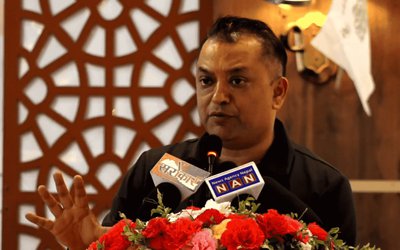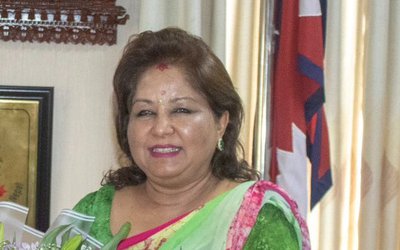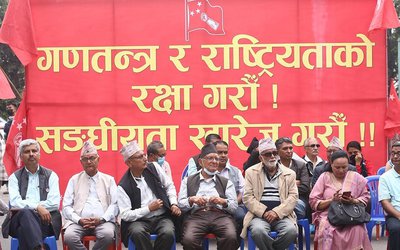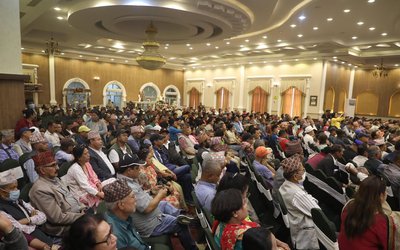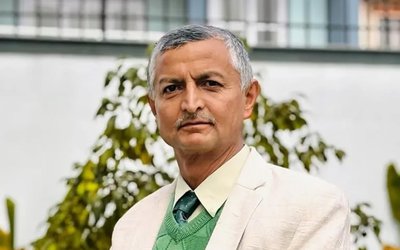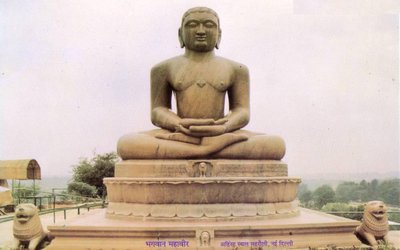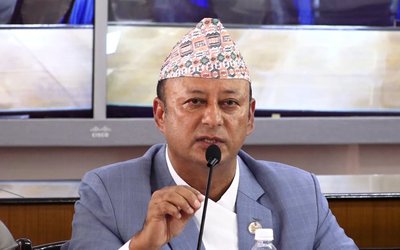
Supported by JICA Nepal, the National Reconstruction Authority (NRA) and the Ministry of Home Affairs (MOHA) jointly organized a seminar to commemorate the 2nd anniversary of Gorkha Earthquake - “From Post-Earthquake Reconstruction to Disaster Risk Reduction: Lessons Learned in Mainstreaming Build Back Better (BBB) in the Recovery and Reconstruction Efforts in Nepal”.
The seminar highlighted progress and achievements in the last two years including JICA’s contribution in diverse areas of recovery and reconstruction work based on the principle of BBB. At the same time, it offered an opportunity for acknowledging the challenges and teasing out important lessons learned which would help accelerate the progress in the coming years.
During his opening remarks, Dr. Govind Raj Pokharel, Chief Executive Officer of the NRA, stated that although there are many challenges in expediting recovery work, the message of BBB has reached villages where people now understand how to build resilient houses, thanks to various partners’ support. Two earthquake victims who have benefitted from JICA’s support shared their hardships, concerns and issues they have faced in rebuilding their lives. Their presentations helped portray a real picture of ordinary people’s situation on the ground, as well as empowerment processes initiated at the individual level.
NRA provided the latest updates on the Government’s reconstruction and recovery efforts and its renewed strategy for accelerating the pace of recovery and reconstruction, followed by a brief overview of Japanese assistance for reconstruction and recovery in Nepal which emphasized how the BBB approach had been incorporated into JICA’s wide range of recovery support. At this 2-year juncture, JICA also expressed its strong commitment to play a leading role in assisting Nepal in the DRR area including its ongoing efforts to operationalize the Sendai Framework for Disaster Risk Reduction (2015-2030) in Nepal.
Kimio Takeya, Distinguished Technical Advisor to the President of JICA, emphasized the unique contributions Japan could make to enhance DRR resilience by taking advantage of its first-hand experiences as an earthquake prone country. His call for improving the DRR preparedness in Nepal was echoed by Krishna Bahadur Raut, Joint Secretary of MOHA, who expressed the Government’s firm commitment to mainstream DRR priority actions into the recovery and reconstruction work as well as the regular development initiatives. Mr. Jun Sakuma, Chief Representative of JICA Nepal, concluded the seminar by reaffirming JICA’s continuous support for rebuilding lives, economies and institutions affected by the earthquake. He stated: “There is no doubt about recovery and reconstruction from the EQ being the most imperative issue. However, drawing the lessons from the recovery and reconstruction process and utilizing them for making disaster resilient society in continuum are equally important.” This was reiterated by Ambassador of Japan to NepalMasashi Ogawa, who said “As a true friend of Nepal and a country with a long history of natural disasters, Japan will continue to support the Build Back Better in Nepal.”
According to a press release of JICA, the Government of Japan has committed a total of NRs 30 billion for supporting reconstruction and recovery in Nepal. Among JICA’s recovery assistance, housing and school reconstruction are the two major projects currently ongoing. Almost 10,000 people have been trained on earthquake-resistant housing. Out of 300 schools targeted for JICA support, 83 schools are being reconstructed in the first phase of the project.
Another major contribution by JICA is a provision of Japanese expertise for rehabilitation of cultural heritage in Kathmandu and Patan. The other types of JICA support include, among others: rehabilitation and reconstruction of public infrastructure, such as hospitals, bridges, health posts, police offices, and VDC offices; provision of livelihood enhancement training for affected farmers; preparation of district recovery and rehabilitation plans in Gorkha and Sindhupalchowk; and technical support in making and utilizing landslide hazard maps of these two districts.
- IME GROUP: Expands Into Paper Industry
- Mar 24, 2025
- CPN UML: Instigated By India
- Mar 23, 2025
- ADB’S CHIEF ECONOMIST: Nepal Reduces Poverty
- Mar 11, 2025
- FM DR. DEUBA: A Successful Visit
- Mar 11, 2025
- MD GHISING: Target Of Personal Grudge
- Mar 09, 2025

